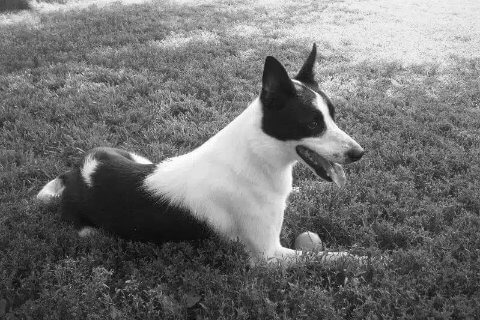
Revelation Knaani Canaan Dogs | David Golden & Cynthia Dodson
Cynthia Dodson and David Golden, Canaan Dog breeders, share breed insights, challenges, and the state of dog shows.
Home » Meet The Breeds » Canaan Dog Breed
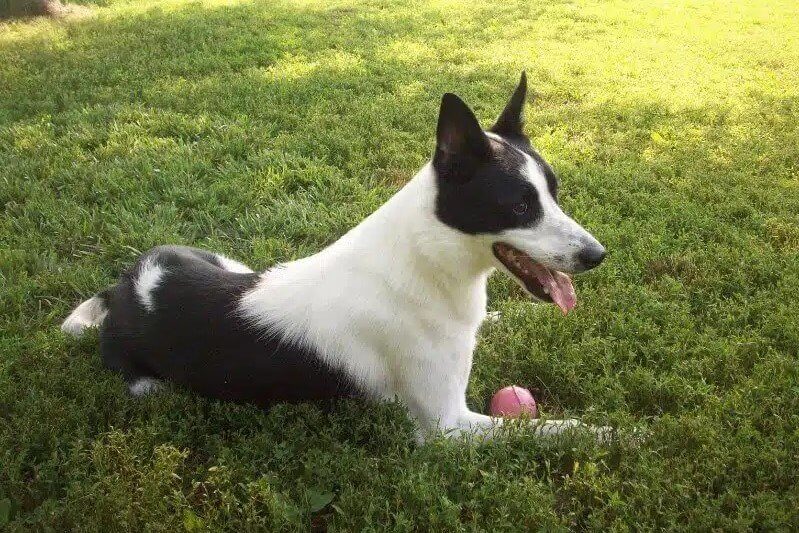
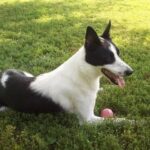
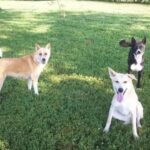
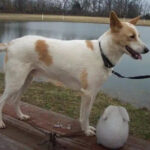
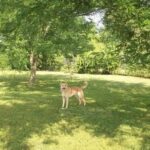
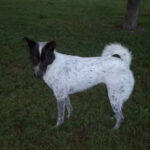
The Canaan Dog, often referred to as “Kelev K’naani” in its native region, is one of the ancient breeds that traces its origins to the biblical lands in and around modern-day Israel. Historically utilized as a herding and sentry dog, these canines have an inherent sense of loyalty and alertness. Their intriguing blend of wild and domesticated traits makes them both captivating and challenging, a testament to the breed’s history of survival in the desert.
Herding
19 – 24 inches
35 – 55 pounds
12 – 15 years
| Country of Origin | Israel |
|---|---|
| Bred For | Herding, Guarding, Companionship |
| Known For | Adaptability, Devotion, Intelligence, Vigilance |
| Popularity | Low |
| Temperament | Alert, Vigilant, Confident |
| Activities | Herding, Running, Hiking, Conformation Shows, Dog Sports |
The Canaan Dog boasts an ancient and fascinating history that traces back thousands of years, intertwined with the early civilizations of the Middle East.
Originating from the region now known as Israel, the “Canaan” is one of the oldest known breeds. Evidence of its existence can be found in ancient carvings and artifacts, depicting dogs with a striking resemblance to today’s breed. Those dogs of antiquity were believed to be companions, guardians, and herders for the ancient Israelites.
Over time, as civilizations shifted and faced upheavals, many of these dogs were left to fend for themselves in the harsh Negev desert. This prolonged period of natural survival in the wild molded the Canaan Dog’s keen instincts, adaptability, and resilience. Yet, despite the challenges, the dogs thrived, hunting small prey and guarding livestock.
It wasn’t until the 20th century that the breed began to gain formal recognition. Dr. Rudolphina Menzel, an Austrian immigrant to Palestine, took an interest in the desert dogs. Recognizing their intelligence and adaptability, she began a breeding program in the 1930s. Interestingly, during World War II, some of the dogs were trained as Service Dogs to assist in tasks like mine detection.
The breed’s recognition journey saw a significant milestone when the Canaan Dog was first recognized by the Israel Kennel Club in 1953. This acknowledgment of the breed’s distinct lineage and characteristics paved the way for international recognition. Just a few years later, in 1966, the breed gained official recognition from the FCI (Fédération Cynologique Internationale). Dr. Menzel played an instrumental role in this achievement, penning the first accepted written Standard for the breed.
The Canaan Dog’s journey to the UK is equally fascinating. Before gaining the stature of a recognized purebred, the Canaan Dog first made its way to the UK from Lebanon in 1965. A mere five years later, in December 1970, The Royal Kennel Club formally recognized the breed, placing it in the Utility Group.
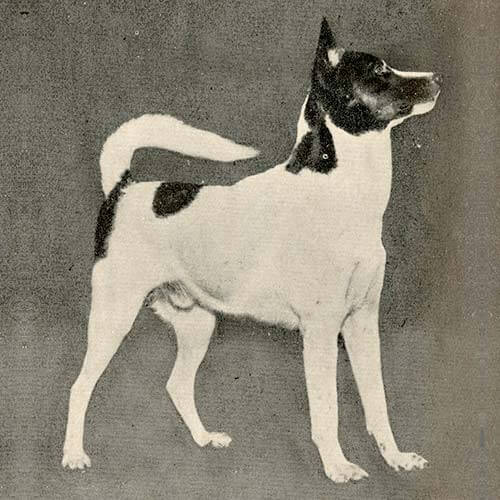
In 1997, the Canaan Dog received formal recognition from the American Kennel Club (AKC), marking a significant milestone in its journey from ancient desert companion to distinguished purebred. This acknowledgment by the AKC further solidified the breed’s standing within the global canine community, showcasing the Canaan’s unique characteristics and deep-rooted history to enthusiasts and breeders in the United States.
Today, the Canaan Dog is a living testament to survival, adaptability, and the deep bonds shared between humans and dogs. The breed’s rich history not only makes these dogs unique, it also serves as a reminder of the ancient connection we all share with our canine companions.
Adult males typically stand at a height of 20 to 24 inches, while mature females are slightly smaller, standing between 19 to 23 inches tall.
Regarding weight, males generally weigh between 45 and 55 pounds, while females range from 35 to 45 pounds. This size makes them a medium-sized breed, well-proportioned and balanced in outline.
The Canaan Dog showcases a harmonious balance between its height and length, ensuring that it does not appear too long or too squat. The breed’s body, though lean, is muscular and robust, a testament to its historical roles that demanded both agility and strength. Substance is moderate, without any appearance of being overly heavy or too delicate. The breed’s overall structure gives an impression of squareness, agility, and endurance,; a dog that is ready to perform tasks with efficiency.
Texture: The Canaan Dog sports a double coat that provides protection against the elements. The straight, flat outer coat is is straight and harsh, lying flat against the body. It is longer on the ruff, top of the withers, back of the thighs, and on the tail where it forms a brush. The outer coat is supported by a softer, dense undercoat. The combination ensures the Canaan remains well-insulated, reflecting its origins in the desert heat and cooler highlands.
| Standard Color | |
|---|---|
| Black | ee |
| Cream | ee |
| Golden | ee |
| Liver | ee |
| Red | ee |
| Tan | ee |
| White | ee |
A Note About Color: Two color patterns are seen in the breed. First, predominantly white dogs may or may not present a symmetrical face mask covering both the eyes and ears. The mask is the same color as any body patches and may or may not have a white blaze between the eyes. Secondly, solid-colored dogs may or may not have white trim on the chest, undercarriage, lower parts of the legs, feet, and top of the tail. Tickling is acceptable on the white areas. Gray and/or brindle dogs are unacceptable in the Canaan.
| Standard Marking | |
|---|---|
| Black Markings | ee |
| Liver Markings | ee |
| Tan Markings | ee |
| Red Markings | ee |
| Cream Markings | ee |
| Gold Markings | ee |
| White Trim | no |
The tail of the Canaan Dog is one of its distinguishing features. Set high and thick at the base, it tapers as it extends towards the tip. When at rest, the tail hangs down naturally, reaching the hocks. It curves slightly; however, when the Canaan is alert or in motion, the tail is carried in a graceful arch over the back, sometimes with a curve towards the side.
The tail is covered with a dense coat, ensuring it is well-insulated. This bushy appearance adds to the breed’s recognizable silhouette. Docking is never done to this herding and flock sentry breed’s tail.
The decision to own a Canaan Dog is not one to be taken lightly. While these dogs are known for their intelligence, alertness, and loyalty, they also carry with them characteristics shaped by centuries of survival in the Middle East’s challenging geography. Being aware of the breed’s unique attributes and temperament can help in fostering a fulfilling relationship between the dog and each member of the household.
In general, the Canaan Dog is a hardy breed with a robust constitution. This hardiness can be attributed to its ancient lineage and the natural selection processes it has undergone in its native habitat. These dogs have not been overly bred for specific physical traits, which very likely contributes to their overall good health.
Lifespan: On average, a Canaan Dog can live anywhere between 12 and 15 years if proper care is given.
While the Canaan Dog is generally a healthy breed, like all breeds and mixed breeds it can be susceptible to certain health conditions. Some potential risks to be aware of include:
Regular veterinary check-ups, and being observant of any changes in a dog’s behavior or physical health, are crucial. Early detection and intervention can often mean a better prognosis and a longer, healthier life for the dog.
A breed with a storied history of survival in the wild terrains of the Middle East, the Canaan Dog brings to its domestic life a wealth of instinctual behaviors and traits. But what does this mean for potential owners?
Firstly, the Canaan Dog is alert and vigilant, often serving as an excellent watchdog. These dogs are naturally wary of strangers, which can be an advantage for those seeking a dog with protective instincts. However, this also means they can be reserved upon first meetings, and early socialization is vital to help them distinguish between friend and foe.
Their independent nature and intelligence mean they can sometimes be a handful. However, they are also keen to please and can form strong bonds with their families. Novice owners who are willing to invest in understanding the breed and committing to consistent training are likely to find a loyal and loving companion in the Canaan Dog.
When it comes to sensitivity, Canaan Dogs can be quite attuned to their environment and their owners’ emotions. This sensitivity can make them a bit more reactive to sudden changes, so a stable and consistent home environment is beneficial.
One major consideration is the breed’s tolerance for being alone. While they are independent thinkers, Canaan Dogs also form strong attachments to their families. Extended periods of solitude can lead to feelings of isolation and potentially destructive behaviors.
On the brighter side, Canaan Dogs typically get along well with other dogs, especially if raised with them from a young age. However, as with any any dog, it’s essential to supervise initial interactions and ensure positive experiences.
For families with young children, the Canaan Dog can be a playful and protective companion. Still, it’s always recommended to teach children how to approach and interact with dogs and to supervise any interactions between dogs and young kids to ensure safety for both.
Lastly, in terms of friendliness toward strangers, as mentioned earlier, the Canaan Dog’s natural wariness means this canine might not be immediately welcoming. However, once these dogs have determined that a newcomer poses no threat, they can be quite amiable.
Feeding a Canaan Dog appropriately is crucial for ensuring it maintains optimal health, energy levels, and longevity. The nutritional needs of a Canaan Dog will vary depending on the dog’s age, activity level, health, and other factors. Here’s a closer look at how to feed this unique breed.
For Canaan Dog puppies, their growth means they require a diet rich in protein to support muscle development. Puppies also burn a lot of energy as they play and explore their environment, so their caloric intake will generally be higher than that of an adult dog. Typically, feeding a high-quality, puppy-specific formula is advised until they reach maturity. This will ensure they receive the right balance of nutrients essential for their growth phase.
Transitioning to an adult formula usually takes place between 12 to 18 months of age for Canaan Dogs. When feeding an adult Canaan Dog, portion sizes and meal frequencies might differ based on the dog’s weight, metabolism, and activity level. On average, an adult Canaan Dog may require about 1.5 to 2.5 cups of high-quality dry dog food daily, divided into two meals. This amount is a general guideline, and it’s essential to monitor your dog’s weight and adjust portion sizes accordingly.
Elderly Canaan Dogs might have reduced activity levels and, therefore, lower caloric needs. It’s essential to adjust their diet to prevent unwanted weight gain, which can put a strain on their joints and organs. There are also senior-specific dog foods available that cater to the nutritional requirements of older dogs.
Fresh water should always be available for your Canaan Dog. Additionally, treats can be a great way to reward your dog, but they should be given in moderation, making up no more than 10 percent of their daily caloric intake.
Lastly, because every dog is unique, it’s beneficial to consult with a veterinarian regarding the best diet plan tailored specifically for a Canaan Dog. This can ensure the dog receives all the essential nutrients it needs to thrive.
The Canaan Dog’s ancient lineage as a free-ranging desert breed has imbued it with a sharp intelligence and a deep sense of independence. When it comes to training, these traits can be both an advantage and a challenge.
This breed’s intelligence means the Canaan Dog is a quick learner. These dogs can grasp new commands and tasks swiftly when motivated correctly. Positive reinforcement techniques, such as treats, praise, and play, are often the most effective methods to engage a Canaan Dog in training sessions. This canine’s desire to please its owner can be harnessed to achieve consistent training results.
However, the breed’s independent streak means it may sometimes have its own ideas about how things should be done. Consistency is crucial when training a Canaan Dog. It’s essential to establish clear boundaries and expectations from the start and stick to them. Regular training sessions, even if short, can help to reinforce commands and behaviors.
While they make excellent watchdogs due to their natural alertness, Canaan Dogs can sometimes display a tendency to bark, especially if they notice something unusual in their environment. Addressing this behavior early on and teaching commands like “quiet” or “enough” can be beneficial.
Their intelligence also means they can sometimes exhibit a degree of wanderlust. A securely fenced yard and supervised outdoor time are crucial. Moreover, recall training, where the dog learns to come back when called, is an essential skill for Canaan Dogs, given their potential curiosity to explore.
In terms of predation, Canaan Dogs have a moderate prey drive, given their history as guardians and herders. While many can live harmoniously with smaller pets, it’s essential to introduce them slowly and monitor all interactions. Some Canaan Dogs might be more inclined to chase, especially if they see small animals running.
The Canaan Dog, with its roots in the challenging terrains of the Middle East, inherently possesses a significant level of energy and stamina. This means these dogs require regular exercise to keep them mentally and physically fit.
| Energy Level | Moderate to High |
|---|---|
| Exercise Requirements | 1 Hour/Day (Minimum), Daily Walks, Vigorous Running, Regular Exercise, Playing with Another Dog, Mental Stimulation |
In terms of exercise needs, the Canaan Dog is moderately active. A daily routine of brisk walks, combined with some playtime in a secure yard or open space, usually suffices. These dogs enjoy activities that stimulate both their body and mind, so incorporating tasks or games that challenge their intelligence can be particularly beneficial.
Energy-wise, they are not as hyperactive as some other breeds, but they still have a steady flow of vitality that needs an outlet. Without adequate exercise, a Canaan Dog might resort to undesirable behaviors like digging or barking out of boredom.
The Canaan Dog’s intensity during exercise is generally moderate. They’re not typically prone to short bursts of extreme energy, like some breeds, but instead display a consistent and enduring enthusiasm. This makes them great companions for longer hikes or extended play sessions.
Additionally, their playful nature shines when they’re given the opportunity to engage in games. Fetch, hide and seek, or agility activities can be great fun for them. It not only helps them burn off energy, it also strengthens the bond between dog and owner.
The Canaan Dog’s coat is designed to protect these dogs from the elements, echoing their history of surviving in the desert regions of the Middle East. Thankfully, their grooming needs are relatively straightforward, making them a relatively easy breed to maintain for many owners.
| Coat Type | Dense, Harsh, Straight |
|---|---|
| Grooming Requirements | Weekly Brushing, Occasional Bathing, Routine Ear Cleaning, Periodic Nail Trimming, Regular Tooth Brushing |
The coat of the Canaan Dog is of medium length, dense, and straight, providing these canines with good insulation against both heat and cold. Their natural coat texture means that they don’t require frequent trips to a professional groomer. Instead, regular brushing at home can help to keep the coat in top condition.
Brushing the Canaan Dog once a week will help to remove loose hairs, distribute natural oils throughout the coat, and keep the skin healthy. This routine becomes especially important during shedding seasons, which usually occur twice a year. During these periods, more frequent brushing might be necessary to manage the increased volume of loose hair.
When it comes to shedding, the Canaan Dog is not an excessively heavy shedder, but this breed does have a regular shedding cycle. Owners can expect a moderate amount of hair around the house, particularly during the aforementioned shedding seasons.
Apart from coat care, regular nail trimming, ear cleaning, and dental care should also be part of the Canaan Dog’s grooming routine. Keeping nails at an appropriate length will prevent overgrowth and related issues, while regular dental care ensures oral health.
Integrating a Canaan Dog into one’s home and lifestyle requires an understanding of the breed’s natural instincts and temperament. This adaptable breed, having survived in diverse conditions ranging from desert landscapes to human settlements, offers unique qualities that can be both rewarding and challenging for some homeowners.
When considering apartment living, the Canaan Dog can adapt well, provided it receives adequate exercise and mental stimulation. The breed’s moderate size and generally calm demeanor indoors make these dogs suitable apartment dwellers. However, a house with a securely fenced yard is an added advantage, giving Canaan Dogs the freedom to explore and play safely.
As for climatic preferences, the breed’s double coat equips the breed to handle a variety of weather conditions. These dogs can tolerate cold weather fairly well, thanks to their dense undercoat which provides insulation. Similarly, their coat also acts as a shield against the sun, making them relatively resilient in hotter climates. However, like all dogs, during extreme temperatures, it’s essential to provide them with protection such as shade in summers or a warm shelter during harsh winters.
In hot weather, they need to have access to plenty of fresh water and it’s best to avoid walking them during the peak sun hours. During colder months, while they can handle the cold better than many breeds, it’s always good practice to monitor them for signs of discomfort.
The allure of a Canaan Dog puppy, with its innocent gaze and playful antics, is undeniable. These little bundles of joy bring a unique blend of the ancient breed’s heritage combined with the enthusiasm of youth. Raising a Canaan Dog puppy requires dedication, patience, and an understanding of the breed’s specific needs during its formative months.
A Canaan Dog puppy, like all puppies, is a curious explorer, eager to learn about its surroundings. This crucial phase of life lays the foundation for the pup’s future health, behavior, and relationship with its human family.
Diet plays a pivotal role during this stage. Puppies have specific nutritional needs to support their rapid growth and development. It’s vital to feed them high-quality puppy food that meets these requirements, ensuring they receive all the essential nutrients for optimal health. Regularly consulting with a veterinarian can help owners determine the best diet and feeding schedule.
Socialization is another cornerstone of a Canaan Dog puppy’s upbringing. Given the breed’s inherent wariness of strangers and strong territorial instincts, early and consistent socialization is imperative. Exposing these dogs to various people, places, sounds, and experiences can help to shape a well-rounded and confident adult dog. Positive encounters during this period can reduce the chances of them becoming overly aggressive or fearful later in life.
Training should begin early, employing gentle yet consistent methods. Remember, puppies have shorter attention spans, so sessions should be brief but regular. Using positive reinforcement techniques, such as praise and treats, can foster a love for learning and reinforce desired behaviors.
Lastly, regular health check-ups are essential. Puppies are susceptible to various ailments, and a consistent vaccination schedule, combined with routine veterinary visits, can ensure they remain healthy as they grow.
The Canaan Dog’s alertness, agility, and intelligence make these dogs suitable candidates for a variety of activities and dog sports. Engaging these canines in competitive activities not only provides physical exercise, it also satisfies the dog’s mental stimulation needs, making it a more content and well-behaved companion at home.
The Canaan Dog’s versatility and intelligence make this breed suitable for a wide range of activities and sports. Whether the search is for a competitive partner or just a dog to engage in some fun, the Canaan Dog is always up for the challenge.
The Canaan Dog is recognized by the world’s leading registries and kennel organizations, which categorize the breed into a specific Group based on its unique characteristics. This breed is recognized worldwide under the following Group designations:
| Organization | Group Designation |
|---|---|
| AKC (American Kennel Club) | Herding |
| UKC (United Kennel Club) | Sighthound & Pariah |
| CKC (Canadian Kennel Club) | Working |
| ANKC (Australian National Kennel Council) | Non-Sporting |
| RKC (The Royal Kennel Club) | Utility |
| FCI (Fédération Cynologique Internationale) | Group 5: Spitz and Primitive Type; Section 6: Primitive Type |
The ideal Canaan Dog is described by a Breed Standard that is approved by each of the world’s leading registries and kennel organizations. The Breed Standards for this breed may be found in the following links:
| Organization | Breed Standard |
|---|---|
| American Kennel Club | AKC Canaan Dog Breed Standard |
| United Kennel Club | UKC Canaan Dog Breed Standard |
| Canadian Kennel Club | CKC Canaan Dogg Breed Standard |
| Australian National Kennel Council | ANKC Canaan Dog Breed Standard |
| The Royal Kennel Club | RKC Canaan Dog Breed Standard |
| Fédération Cynologique Internationale | FCI Canaan Dog Breed Standard |
Breed clubs play an integral role in preserving, promoting, and educating the public about specific breeds. Their members work tirelessly to ensure that the breed’s Standard is upheld, organize events, and provide resources for both breeders and owners. For those interested in the Canaan Dog, joining a breed club can be an invaluable experience, offering insights, guidance, and a community of fellow enthusiasts.
In the United States, the primary organization dedicated to the Canaan Dog is the Canaan Dog Club of America (CDCA). Established in 1965, the CDCA serves as a hub for breed enthusiasts, providing information on the Breed Standard, breed health, and national and international events. The club also works closely with the AKC to represent the interests of the breed.
In the United Kingdom, the British Canaan Dog Society takes the lead. This club has been instrumental in fostering a love for the breed in the UK, ensuring that the Breed Standard is upheld, and organizing events to showcase the breed’s unique qualities.
For those passionate about the Canaan Dog, joining a breed club can be an enlightening and enriching experience. Whether you’re a breeder, owner, or simply an admirer, these clubs offer a wealth of resources, events, and a tight-knit community of like-minded individuals.
Rescue organizations play a pivotal role in providing a safety net for Canaan Dogs that may find themselves without a home due to various reasons, from owner surrenders to those rescued from unfortunate circumstances. These groups not only provide immediate care, they also work towards finding these dogs loving, forever homes.
In the United States, the Canaan Dog Rescue Network is a dedicated organization that specializes in the rescue and rehoming of Canaan Dogs. Its volunteers work diligently to ensure that each dog is placed in a suitable environment where it can thrive. The group’s commitment extends beyond just rescue; it also educates the public on the breed’s specific needs and unique characteristics.
For those interested in adopting a Canaan Dog, it’s beneficial to reach out to breed clubs in the respective countries. These clubs will often have networks or connections with rescue organizations and may be able to provide leads on Canaan Dogs in need.
Yes, the Canaan Dog sheds. Like many breeds with a double coat, these dogs go through shedding seasons, typically in the spring and fall. Regular grooming can help to manage the shedding and keep the coat healthy.
The Canaan Dog is agile and quick-footed, known for its desert survival capabilities. While these dogs aren’t recognized for exceptional speed like some racing breeds, they can run at a decent pace when motivated, likely around 20-25 miles per hour, depending on the individual dog’s health and fitness.
Yes, the Canaan Dog has strong territorial instincts and can serve as an effective guard dog. The breed’s history as a free-ranging desert dog has made it naturally wary of strangers. Coupled with its loyalty to the family, this makes the Canaan a diligent watchdog.
Canaan Dogs, when properly socialized, can be good with kids. They are loyal to their families and can form strong bonds with household members, including children. However, as with all breeds, supervision during interactions between dogs and young children is essential.
No, the Canaan Dog is not considered hypoallergenic. The breed sheds, and like all dogs, it produces dander, which can trigger allergies in sensitive individuals. Those with dog allergies should spend time with the breed before considering acquiring one.
As previously mentioned, the Canaan Dog is not classified as hypoallergenic. While no dog is truly hypoallergenic, some breeds produce fewer allergens than others, but the Canaan Dog doesn’t fall into this category.
Canaan Dogs have a diverse vocal range and can be quite communicative. While they might not bark excessively, they can be vocal when announcing strangers or when they’re expressing themselves. Training and socialization can help in managing unwanted barking.
While the Canaan Dog is independent in nature, like all dogs, it thrives on human interaction and can become lonely or develop behavioral issues if left alone for extended periods regularly. If left alone, these dogs should be given toys, a secure environment, and regular exercise when the owner is present.

Cynthia Dodson and David Golden, Canaan Dog breeders, share breed insights, challenges, and the state of dog shows.
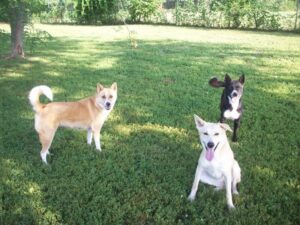
Explore the vast array of color patterns and variations in Canaan Dog breed, from the common black and white patches to the rare solid red.

Cynthia Dodson and David Golden, Canaan Dog breeders, share breed insights, challenges, and the state of dog shows.

Explore the vast array of color patterns and variations in Canaan Dog breed, from the common black and white patches to the rare solid red.
The best way to ensure a long and happy relationship with a purebred dog is to purchase one from a responsible breeder. Not sure where to begin?
Contact the National Parent Club’s Breeder Referral Program, which is listed on the AKC Breeder Referral Contacts page.
